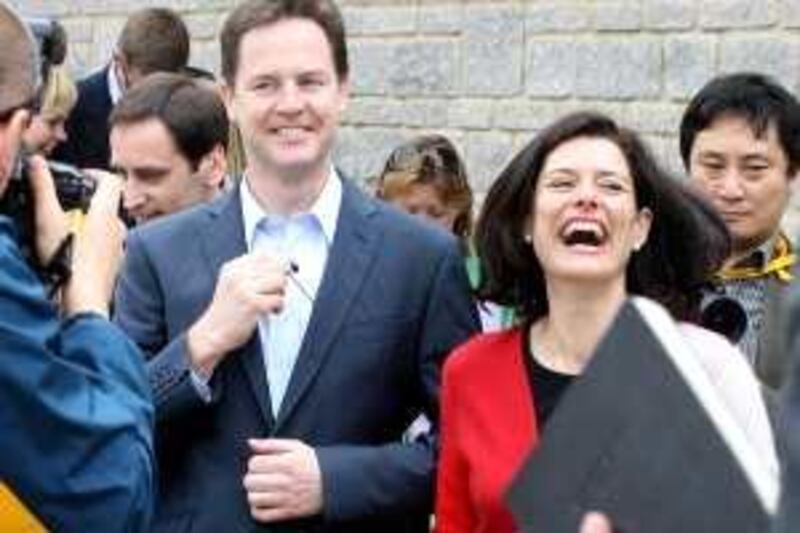LONDON // More than 20 million Britons tuned in for the three televised election debates that may have transformed British politics forever, it was revealed yesterday. Half a century after American voters revelled in the first television debate between Nixon and Kennedy, the British have had their first opportunity to see the leaders of the three main political parties take part in live, televised discussions.
The results have been remarkable. Nick Clegg, the leader of the Liberal Democrats, has seen his party's standings in the polls leap from about 20 per cent to 30 per cent. Gordon Brown, the prime minister, who rarely appears comfortable before the cameras, has been little more than a spectator as his Labour Party had slumped to third place in most polls. And David Cameron, the Conservatives' PM-in-waiting - or so it appeared just a few weeks ago - has seen the Tories double-figure lead in the opinion polls slashed.
Messrs Brown and Cameron received tuition for the television appearances from staff who had helped Barack Obama to success in the United States. Mr Clegg went with what he had, and it paid off. "His naturalistic approach stood in contrast to the more mechanical efforts of his opponents, whose debate prep was too often visible on the air," Alan Schroeder, an associate professor in the School of Journalism at Northeastern University in Boston, told the Huffington Post website.
Robin Oakley, CNN's political correspondent in the UK, said that if the election ends in a hung parliament after voting on Thursday, it will be the debates that have brought it about."The four-and-a-half hours of detailed and sometimes passionate debate," he said, "have not only had a significant effect on the likely outcome of this contest, they have probably changed the whole shape of British politics. By giving equal billing to Nick Clegg, who seized his opportunity brilliantly, they have quite possibly speeded the progress of multi-party politics, which was already on the way."
Mr Brown was the big loser from the debates and, yesterday, was trying his best to put it all behind him. "The time for debates has finished and the time for decision has begun," he said. " Mr Cameron admitted that the campaign was "far from won". Andrew Grice, the political editor of The Independent newspaper, said that, while he liked the idea of televised debates, he felt that they had "completely skewed" the campaign. "You have at least two days of build-up, then you have the debate and then the inquest," Mr Grice told The New York Times. "Then the opinion polls days later appear to be driven by the TV debates."
The debates have come at a cost, with the party leaders abandoning most of the daily, early morning press conferences that used to set the daily agenda for the campaign and place the politicians in a position where they had to face incisive questioning from reporters. There are even suggestions that the UK's experiment with televised debates might not last long in their current form. The Wall Street Journal pointed out that Canada had to expand its television discussions to incorporate smaller parties and that the British might have to do the same next time round.
The Scottish National Party mounted an unsuccessful legal bid last week to be included in the final debate and their counterparts in Wales and smaller parties, such as the UK Independence Party and the far-right British National Party, are all likely to make similar demands whenever the next election is held. "Eventually, probably by the next election, the leaders' debates will feature a line-up not of three but four, five, six or seven politicians from across the UK," The Wall Street Journal said in a political blog.
"This is the problem with trying to run televised leaders' debates in a parliamentary rather than a presidential system. They quickly become unwieldy and, as a consequence, very dull." dsapsted@thenational.ae






